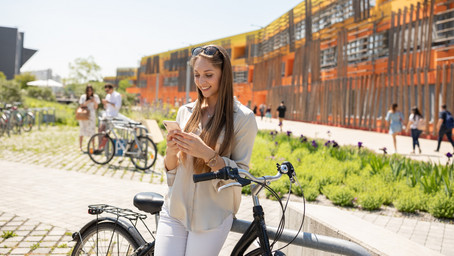Your sustainable stay abroad
Are you preparing for a study or work stay abroad and want to travel in an eco‑friendly way? If you are looking to make your time abroad more sustainable, this website offers a range of tips to help you make environmentally conscious choices.
- Choice of destination
- How to get there eco-friendly
- Support for Travel Costs (Erasmus+ funding)
- Interrail Pass for Erasmus+
- Things to consider on site
- Good to know
Choice of destination

Thinking about where to go for an exchange semester, an International Short Program (ISP), or an internship abroad? Choosing a nearby destination comes with benefits: less travel time for you (and anyone visiting you) and more opportunities to use sustainable travel options like buses and trains.
How to get there eco-friendly
Train or bus travel is more environmentally friendly than flying. Car sharing or carpooling can also be good alternatives. However, some destinations may only be reachable by air. In such cases, choose flights with as few stopovers as possible to reduce emissions. As a compromise, consider flying to a major hub and continuing your journey by train or bus. Before you travel, make sure that local transport options at your destination are safe, reliable, and well-connected.
Support for Travel Costs (Erasmus+ funding)
For exchange semesters and internships abroad: As a general rule, students traveling less than 500 km should use environmentally friendly means of transport (Green Travel). These include: bus, train, and bike. Find more info on financial support for travel costs:
Interrail Pass for Erasmus+
Eurail has partnered with the Erasmus Student Network (ESN), offering outgoing Erasmus+ students the opportunity to purchase train tickets at an attractive rate.
Two options available: Four travel days or six travel days within six months
How to purchase: Scroll down to “Choose your Interrail Pass for Erasmus+”, select your preferred pass, add it to your cart, and complete the purchase. You will then be forwarded to the next steps.
How to use: Add your Interrail Pass to your smartphone. To do so, please refer to the instructions provided in this video.
Seat reservations: Since train travel is increasingly popular and trains can fill up quickly, we strongly recommend making seat reservations in advance. This is possible through Interrail/Eurail or local providers, such as ÖBB. Additional costs may arise and can vary depending on the train provider.
Things to consider on site

Here are some practical tips for an eco-friendly stay abroad:
Use public transport: Opt for public transportation whenever possible. If available, consider using car-sharing services or renting a bike.
Stay longer in fewer places: To truly immerse yourself in the local culture, spend more time in each location. This approach allows you to experience the local people, culture, and nature more deeply, beyond just visiting tourist sites.
Opt for sustainable accommodation: Choose places that prioritize eco-friendly practices, such as energy-efficient buildings, recycling programs, and locally sourced, seasonal food. To further reduce waste and costs, consider buying second-hand furniture and kitchen essentials. Connecting with former exchange students who are leaving the country can be a great way to find these items affordably.
Conserve water: Be mindful of your water usage. Even while on vacation, keep showers short and reuse towels when possible.
Learn about local waste separation: Familiarize yourself with local waste separation practices and always dispose of trash in designated bins to respect the environment.
Minimize plastic waste: Bring reusable items like a cotton bag, water bottle, and lunch box from home to avoid single-use plastic and unnecessary costs. In areas with drinkable tap water, using a reusable bottle can help you save money and reduce waste.
By following these guidelines, you can contribute to a more sustainable and respectful travel experience.
Good to know

Use the Trainline and Interrail/Eurail websites to compare train routes, prices and ticket bookings within Europe.
Traivelling is a website that allows you to look for train and bus routes. It shows suitable connections and price rates – even for long distance routes. Further, you can add personal discount cards (e.g., ÖBB Vorteilscard) to your booking.
With EcoPassenger, you can compare your emissions and other environmental impacts by mode of transport (for travel within Europe).
You can find more suggestions on sustainable behavior via the Green Erasmus website.
